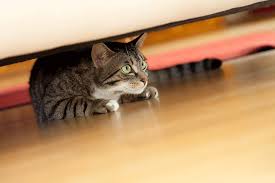
Stress and anxiety can have debilitating effects on a human’s health. Stress in cats acts much the same way. Not only can it exacerbate existing physical conditions, but it can lead to a number of problems often considered behavioral, such as litter box avoidance, aggressive behavior, or depression and withdrawal.
When behavioral problems suddenly appear, savvy cat owners soon learn to look first for signs of health problems, such as urinary tract infections with litter box avoidance, and next for stress factors, such as changes in the environment.
So how can you ensure your kitty is as comfortable as possible? Read on to learn more about the causes, signs and solutions for a cat experiencing stress.
Causes of Stress in Cats
Cats are creatures of habit and do not deal well with change. Even subtle changes in a cat’s environment can lead to stress. Substantial changes, such as moving or the introduction of a new baby, spouse or another animal to the household, can have devastating effects. Other external factors that may cause your cat anxiety can include a recent vet visit, a change in their (or your) daily routine, construction or a loud party. What your cat can see out the window may also play a role, even for a strictly indoor cat, as other neighborhood animals can be scary.

Cats are known to bolt from sudden loud noises like fireworks and even the vacuum. But natural disasters such as earthquakes, hurricanes and tornados can be felt by your feline friend in advance and can also cause a fear related stress response.
Multi-cat households often have one cat that gets picked on by another, creating a constant source of conflict and competition, often leading to stress.
Sometimes we are also a stressor, if we want to cuddle, hold or play with an animal who would prefer to be left alone. So be sure to take your cat’s personality into consideration.
Signs Your Cat May Be Stressed
There are many signs and symptoms cats exhibit in times of stress, some of which may not be as obvious as others, all differ depending on the stressor and the individual.


Cats often show they are stressed by engaging in destructive behaviors like scratching up the wall or furniture. Others may do the opposite, preferring to isolate and hide. Some may turn aggressive and scratch, bite or attack people or other pets. Their physical stance maybe crouched with a tense body, tail tucked in, head lowered and pupils dilated. More vocal kitties may begin to meow excessively, hiss or even growl.
When there is a constant or recurrent source of stress, you may see signs of skin, gastrointestinal or urinary issues. Some cats will obsessively groom themselves, to the point they may become raw and/or bald in areas. There could be vomiting or diarrhea, a change in appetite, or the cat may suddenly start urinating outside of the litter box.
All of the above may be signs of stress, however, sudden changes in behavior warrant a trip to your vet to rule out any potential medical causes before focusing on eliminating stressors.
Solutions for Your Cat’s Stress and Anxiety
Removing the stressor is the best way to ease your cat’s anxiety. This may include reverting back to a brand of food you know your cat liked or minimizing competition in the household by adding more litter boxes and food bowls. It may be as simple as keeping the blinds closed or be as drastic as keeping pets separated or no longer hosting loud parties.
If eliminating the cause of the stress is not possible, you may consider pheromone sprays, wipes, diffusers, collars and plug-ins which have been shown to have a relaxing effect.

Slow introduction to new family members is best approach to help your feline friend welcome new family. Allow your feline friend time to get to know this new member by allowing them to smell them from across doors or even blankets and toys. This gives your kitty a chance to know that they are not of any danger.
When it comes to loud noises like thunder, construction and fireworks having a quiet familiar location where they can escape the loud chaos helps reduce anxiety. Adding soft soothing music, comfortable hiding places and keeping lights low can also be helpful.
It is important to observe your cat’s body language and behavior patterns to tell if they are satisfied with their living basics because some things are very easy to fix once you know the problem. For example, they may not like a certain brand, type or flavor of food. Their water bowl may not be clean enough. Or they may not be using their litter box simply because it is next to the loud radiator.

Respecting your cat’s personal preferences and boundaries may also reduce the amount of stress they experience. Not all cats like to be picked up, snuggled or pet repeatedly. Each is an individual and their personal boundaries must be respected as you would another human being.

Environmental enrichment also helps many cats. A cat’s natural behaviors are hunting, exploring, and socializing. When prevented from performing their natural behaviors, a cat’s only options are sleeping, eating, and grooming. Evaluate your cat’s living areas and make sure there are areas for hiding, climbing, scratching, and sleeping. Toys, catnip, kitty grass and water fountains are all sources of pleasure for many cats and can provide entertainment and distraction from potential stressors.
In severe cases, your vet may be able to recommend a food or medication for your cat’s specific issue or to help make your cat feel calmer and be more open to other methods of reducing anxiety so be sure to discuss any concerns you have about your cat’s behavior.

Cats deal with their emotions much like we do – completely differently! Some are better at hiding the issues than others, while some wear their hearts on their sleeves. Whatever your cat does in times of stress, it is important to pay attention to the changes. They are trying their best to let you know that something is wrong, and as pet parents it is our job to find out what is causing them stress and see what we can do to help.





Leave a Reply